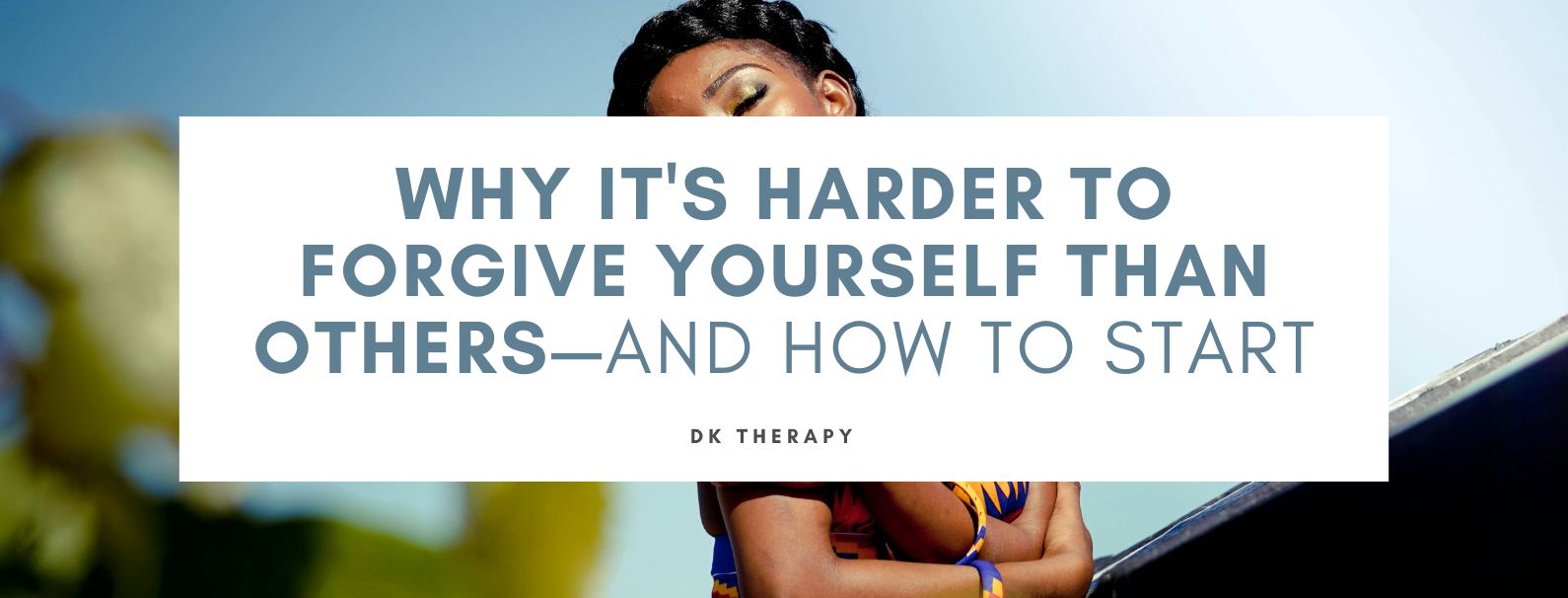
People often value forgiveness as a path toward healing and inner peace. Yet, when it comes to forgiving ourselves for our mistakes, many of us struggle. We forgive others for the same trespasses we punish ourselves for, because it’s a challenge to let go of guilt and regret. However, to live a happy, healthy life, we need to be able to treat ourselves with the same compassion we direct to our loved ones.
Change is easier said than done, though, so how can you begin to cultivate self-compassion and start to forgive yourself? Keep reading for tips.
Why Is It So Hard to Forgive Yourself?
 When someone else hurts us, we can recognize their faults and decide whether to move forward. However, when we make our own mistakes, we often hold onto them as proof of our perceived inadequacy. Personal accountability, while important, can lead to self-judgment rather than growth.
When someone else hurts us, we can recognize their faults and decide whether to move forward. However, when we make our own mistakes, we often hold onto them as proof of our perceived inadequacy. Personal accountability, while important, can lead to self-judgment rather than growth.
In addition, many people struggle with forgiving themselves because they hold themselves to impossible standards. If you believe you should never fail or make mistakes, any misstep feels catastrophic. Unlike others, whom we may grant grace and understanding, we often don’t extend the same kindness to ourselves.
Finally, some people resist self-forgiveness because they believe it will make them complacent going forward. They fear that if they stop beating themselves up about something they’ve done wrong, they might repeat the same mistake. This introduces a negative cycle where self-punishment is mistaken for personal growth.
How to Forgive Yourself
The first step to forgive yourself is recognizing what you’re feeling and why. Instead of suppressing your guilt or shame, allow yourself to sit with these emotions. Understanding them helps you process them more effectively. Why are you upset? What harm have you actually done? With a clearer view of the situation, you have a better opportunity to think critically.
Next, try to remove yourself from the situation for a moment. Think about how you would respond if your friend or someone you love deeply made the same mistake. Would you scream at them or berate them? Would you remove them from your life, or would you understand that they’re human beings, and thus, prone to making mistakes?
Most likely, you’d encourage them to learn and move forward, so why not grant yourself the same mercy? You don’t have to punish yourself in order to learn and grow.
Take Responsibility Without Self-Punishment
Owning your mistakes can be very freeing; it doesn’t mean you need to dwell on them forever. Accepting responsibility should be about growth, not endless self-criticism. Apologize if necessary, make amends where you can, and move on with your life. No good will come from constantly wearing yourself down over something that has already happened.
Forgiveness comes from a place of kindness, remember. A kind and mature person typically forgives others when they’ve learned from a mistake they made. Treat yourself with the same acceptance and kindness you would with anyone else. After all, it’s important to set expectations when it comes to the compassion you expect, from yourself and others.
Forgiving yourself isn’t about excusing harmful behavior, though. Acknowledge mistakes you’ve made, take time to understand their impact, and do the best you can to become a better person for it. Growth and maturity don’t happen overnight, and the sooner you allow yourself the grace to move forward, the sooner you can find peace within yourself and the world around you.
If you’re struggling to forgive yourself and you’d like to work with a therapist, we encourage you to reach out to DK Therapy and schedule an appointment with our office.




